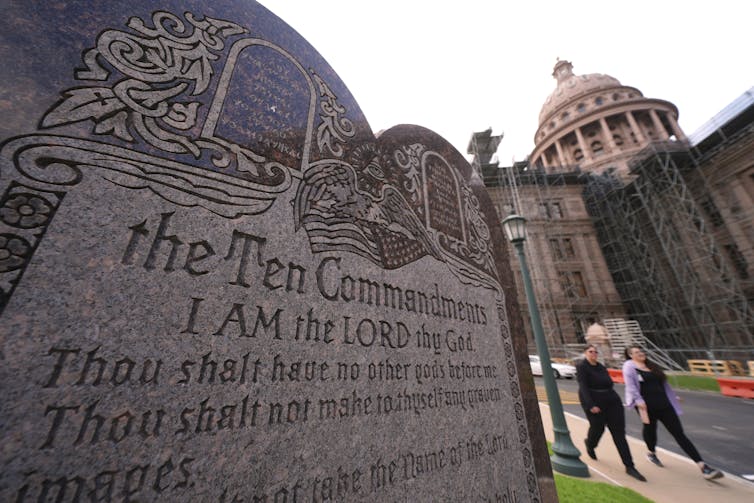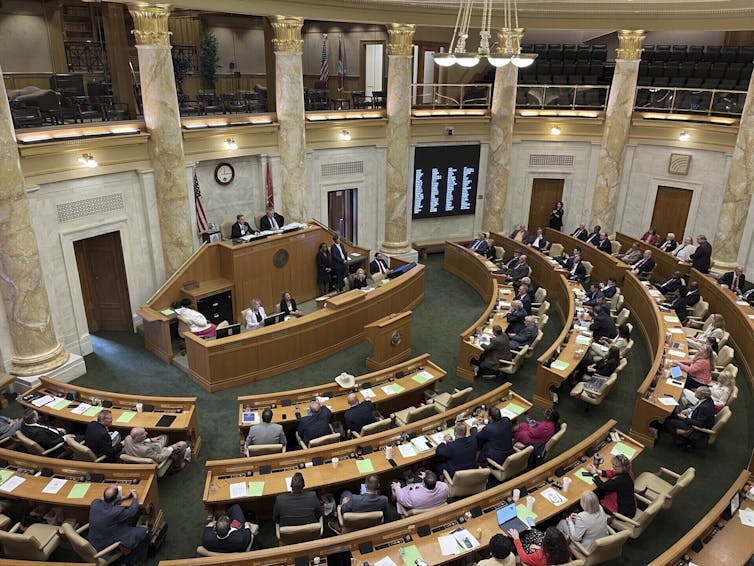
By Charles J. Russo with Lydia Artz
As disputes rage on over religion’s place in public schools, the Ten Commandments have become a focal point. At least a dozen states have considered proposals that would require classrooms to post the biblical laws, and three passed laws mandating their display in 2024-2025: Louisiana, Arkansas and Texas.
All three laws have been at least partially blocked – most recently Texas’ law – after federal trial court rulings. But the ongoing cases seem aimed at overturning a 45-year-old U.S. Supreme Court precedent prohibiting the posting of the Ten Commandments in public schools.
As religion and education law researchers, we believe this situation is especially noteworthy because of its timing. The Supreme Court has been using a new standard to assess religious freedom cases – and its judgments on religion’s role in public education are perhaps the most religion-friendly they have ever been.
The Ten Commandments and the courts
Litigation over the Ten Commandments is not new. More than a dozen early cases generally upheld laws and policies mandating their recitation in schools. These enactments survived because the Supreme Court did not extend the First Amendment to the states until 1940.
However, the issue of posting the commandments in schools first surfaced in 1980. In a case called Stone v. Graham, the Supreme Court struck down a Kentucky statute requiring displays of the Ten Commandments in classrooms. The court reasoned that the law violated the First Amendment’s establishment clause: “Congress shall make no law respecting an establishment of religion.”
At the time, the court used three criteria, known as the “Lemon test,” to evaluate whether a government action violated the establishment clause. According to this test – which developed from a 1971 Supreme Court decision – governmental actions must have a secular legislative purpose, and their main effect may neither advance nor inhibit religion. In addition, they must avoid excessive entanglement with religion.
When Kentucky’s case came before the court, justices rejected its argument that the displays served a secular educational purpose. The majority did not think that a small notation on posters describing the Ten Commandments as the “fundamental legal code of Western Civilization and the Common Law of the United States” was sufficient, and wrote that the posters were “plainly religious in nature.”
Twenty-five years later, in 2005, disputes over public displays of the Ten Commandments reached the Supreme Court once more. This time, the displays were not in schools. But the first controversy arose, again, in Kentucky.
Officials in two counties had erected displays at courthouses that included the Ten Commandments, Magna Carta and the Declaration of Independence. The justices limited their order to one dispute, in McCreary County, invalidating the display for violating the establishment clause – largely because it lacked a secular legislative purpose.
On the same day, though, the Supreme Court reached the opposite result in another case, Van Orden v. Perry. The court permitted a display including the Ten Commandments to remain on the grounds of the Texas Capitol in Austin, where it was one of 17 monuments and 21 historical markers.

AP Photo/Eric Gay
Unlike the fairly new displays in Kentucky, the long-standing one in Texas, with the first monument erected in 1891, was built using private funds. The court left the Ten Commandments monument in place because it was a more passive display. The Capitol grounds are spread out over 22 acres, meaning the display was not as readily apparent as if it had been posted in classrooms for children to see every day.
‘Follow God’s law’
In 2024, a federal trial court in Louisiana blocked a state law mandating that the Ten Commandments be posted in public schools. Undeterred, Arkansas and Texas passed similar legislation the following year.

AP Photo/Andrew DeMillo
Arkansas Act 573, signed into law in April 2025, obligated officials to display a “durable poster or framed copy” of the Ten Commandments in all state and local government buildings, including public school and college classrooms.
Republican Rep. Alyssa Brown, one of the Arkansas bill’s sponsors, described it as an effort to educate students on how the United States was founded and how the founders framed the Constitution.
“We’re not telling every student they have to believe in this God,” she told a legislative committee, “but we are upholding what those historical documents mean and that historical national motto.”
Texas, meanwhile, adopted a similar law in June 2025.
“It is incumbent on all of us to follow God’s law, and I think we would all be better off if we did,” the bill’s sponsor in the Texas House, Republican Rep. Candy Noble, said during debate.
Shift at SCOTUS
Supporters of these laws have claimed that they are constitutional because of an important shift at the Supreme Court. In 2022, the court adopted a new “history and tradition test” to assess religion in public places, including classrooms.
The “history and tradition test” originated in Kennedy v. Bremerton School District, a case about a public high school football coach who prayed on the field at the end of games. The Supreme Court ruled in 2022 that school officials could not prevent him from doing so, because it was personal religious observance protected by the First Amendment’s other religion clause: that the government shall not prohibit the “free exercise” of religion.
Kennedy charted a new course on religion’s place in public life. Acknowledging that it “long ago abandoned Lemon and its endorsement test offshoot,” the justices explained that “the Establishment Clause must be interpreted by ‘reference to historical practices and understandings.‘” It remains to be seen how this vague standard plays out in later cases.
Blocked – for now
Opponents quickly challenged Arkansas’ law. Seven families from various religious traditions filed suit, arguing that it was a direct violation of both the establishment and free exercise clauses of the First Amendment.
On Aug. 4, a federal trial court judge ruled in the families’ favor. The court found that the required display would have “forced [students] to engage with” the Ten Commandments, and “perhaps to venerate and obey” them. The trial court also applied the new historical practices and understandings test, holding that there was no evidence of a tradition to display the Ten Commandments in public schools permanently.
The court thus temporarily barred school boards from enforcing Act 573, pending any further appeals.
Two weeks later, a federal trial court in Texas temporarily blocked the law on the ground that it likely violated the First Amendment, though the judge’s order only applies to 11 districts.
Religion’s role
Controversy over the Ten Commandments continues to raise larger questions over the role of religion in public education.
Supporters of such bills seemingly fail to recognize that they cannot impose their religious values in the public sphere. At the same time, some opponents – including Jewish, Christian, Unitarian Universalist, Hindu and nonreligious plaintiffs – do not necessarily wish to remove religion entirely from educational institutions.
These critics want to uphold the principle, as the Supreme Court announced, that the government must demonstrate “neutrality between religion and religion, and between religion and nonreligion.” In other words, critics do not want one religion or religion generally to dominate.
Today’s challenge is to find the balance in public life. We believe the courts and legislatures must avoid sending the message that religion has no place in a free and open society – just as they must not permit one set of values to dominate, as the bills in Arkansas and Texas seem to aspire to do.
How the courts and legislatures balance the rights of the majority and minority in these disputes over the place of the Ten Commandments in public life may go a long way toward shaping the future of religious freedom in American public education.
![]()
AUTHOR





























JT says
What a shame- separation of church and state. Really would make students of differing religions feel off! Doesn’t seem like a good idea. If our government doesn’t want teachers to politicize, then why would it be okay to put specific religious doctrines in place. It just doesn’t make sense-
Deborah Coffey says
It is time to stop the religious fanatics commonly known as “fake” Christians. It’s time to put all their faces to the mirror by showing them the man THEY put into our White House. They literally voted in favor of the 7 Deadly Sins:
Pride
Greed, or covetousness
Lust, or inordinate or illicit sexual desire
Envy
Gluttony
Wrath, or anger
Sloth
Pogo says
@You say SCOTUS ruling
… Saint Charlie casts a shaft of light from the hereafter, and a fanfare of Elon rocket thunder herald a Trump fatwa — a mighty blast of Trump’s nostril and all is accomplished.
Sherry says
Pushing “IN” the 10 Commandments. . . which the Maga lord and master commonly breaks all the time. . . but, forgetting the “Golden Rule”= “Do unto others as you would have them do unto you”. Sounds like Christian twisted indoctrination to me!
Make America “white and Christian”. . . bring back slavery and male domination. . . right Maga???
Skibum says
Why states, or people for that matter, continue to push and try to force everyone to believe their specific version of religion over others is beyond me. They not only want all others to agree with them, they demand that everyone, in this case, in our nation’s schools, actually be forced to participate in those religious beliefs whether they want to or not.
It is beyond frustrating that we have people in our society to want our schools to be religious indoctrination facilities. These same people will obviously fight any attempts to also allow students to openly adhere to religious studies and practices which the indoctrinators DON’T like or agree with… you know, like Islam, Buddhism, Hinduism, etc. No, ONLY American Christianity will do for ALL students, regardless of their race, their ethnicity, their beliefs or their family’s religious preferences.
If a student says they are agnostic or an atheist, well that will just NOT do! They had better find a God, somewhere, and start worshiping during school hours by God!
Wouldn’t it be better for everyone if our schools simply agreed that there are commonly acceptable “RULES TO LIVE BY” if they wished to prominently display some type of conduct code as an example for students” Well what do you know… there already is such a thing, which I offer in the link below that we all should be able to agree is non-controversial and applicable to all:
https://daringtolivefully.com/simple-life-rules
sue says
We can’t have the commandments but we can have Transgender rhetoric fed to the children as acceptable behavior. TDS at it’s finest LMAO
Sherry says
@sue. . . please post a link to “credentialled facts” regarding harmful “transgender rhetoric being fed to children”, otherwise we will all know that you only post fear and hate filled Fox BS. Thanks!
Laurel says
Skibum: They are like condo commandos. It’s about control, by people who have felt powerless all their lives. Trump knows this and abuses this weakness for his benefit.
Deborah Coffey says
@ Sue
I’m not sure who’s deranged. The FACTS have proved that Donald Trump is a liar, a tax evader, a serial adulterer, a likely pedophile (to be proved once we get the Epstein files), a likely murderer having six speedboats blown up with no proof of who’s in them and no produced drugs, and a criminal all the way around. Is there even a law he hasn’t broken? Can you name one?
Kennan says
Thank you SHERRY!!!!!!!!
Laurel says
This young man is my new hero! He is a devout Christian, and was a school teacher. I love this man’s logic! Texas Representative James Talarico on the Ten Commandments in public schools:
https://www.youtube.com/watch?v=we0b04Qbbvc
Hope for sanity!
Sherry says
Thank you for posting this link Laurel! James Talarico has great debate chops and is not afraid to use them.
You are so very welcome Kennan and right back to ya!
Sherry says
@ sue. . . I strongly suggest that you click on the link Laurel has provided and listen carefully to the words of James Talarico.
Labeling absolutely everything you disagree with as “TDS” merely demonstrates the shallowness of your thinking. Deborah was most certainly correct when she pointing out all the “FACTS” regarding the many flaws of donald trump, which make him “UNTRUSTWORTHY” and completely “UNFIT”for office. . . in the minds of educated, moral, reasonable, thinking citizens.
Let me ask you a couple of questions, sue.
1. Is donald trump a “Convicted Felon”?
2. Has donald trump been found “GUILTY” of “Sexual Assault” and then “Defamation” of his Victim?
3. Have a multitude of Fact Checkers proven that donald trump has told over 30,000 lies and therefore is not trustworthy?
4. Has the trump administration bombed boats and killed people with “NO Due Process/Concrete Evidence of Wrongdoing”?
If even ONE of questions has a YES answer, why do “YOU” think the man is worthy of your sacred vote and your continued support? What has happened to your moral compass? Why would you even imply that those like Deborah and myself are somehow deranged or deficient in some way? How did you allow such anger and hate of people like us enter your heart?
Skibum says
Oh dear Sue,
Unless you are a man named Sue, just how many transgender folks do you know anyway? Don’t know even a single one is my guess, am I right? If so, what gives you the right to talk negatively about people you have never met in your life and do not know?
I’m sorry to have to inform you of this truth, but disparaging others who are strangers to you simply because of things about them that you disagree with is NOT very “Christian” like. It comes from a standpoint of ignorance. A trans person’s life is THEIRS to walk, and theirs alone. You do not get a say in how other people go about their lives, no matter how many bible verses you care to recite.
And by the way, if you were to put hatred aside and follow Jesus’ example, he was often found on his knees with a pan of water at the feet of the downtrodden, the despised, those who were cast out and disparaged. You might want to try being more like the example of Jesus instead of the horrible examples of those who are at the top of our current federal government right now. There is way more than enough hatred, exclusion and condemnation from those idiots already, without adding your own negativity and hatred of others to the mix. Maga and the white nationalist “Christian” cult may welcome you for it, but Jesus would not.
Skibum says
Thank you, Laurel, for that eye opening video of Texas rep James Talarico taking that woman to task for her support of making all schools post the 10 Commandments in every classroom. While there is nothing wrong with the 10 Commandments, I don’t understand why it is so difficult for people to understand why it is not the federal government’s role nor any state government’s role in advocating or legislating in support of religion in general or holding up as an example one preferred religion while disparaging other religions. America’s governments should only be passing laws mandating religious “commandments”, public prayers, etc. when they are willing to pass laws mandating that all of our nation’s churches teach education classes like mathematics and chemistry.
It was also reported that Rep. Talarico gave a sermon in which he said too many people calling themselves Christian focus on the love of power rather than the power of love.
Amen to that!